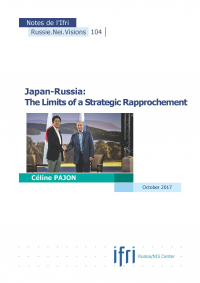Gateway to Think Tanks
| 来源类型 | Publications - Policy Papers - Russie.NEI.Visions |
| 规范类型 | 简报 |
| DOI | 978-2-36567-766-0 |
| Japan-Russia: The Limits of a Strategic Rapprochement Russie.Nei.Visions, No. 104, Ifri, October 2017 | |
| Céline PAJON | |
| 发表日期 | 2017-10-26 |
| 出处 | Russie.NEI.Visions |
| 出版年 | 2017 |
| 概述 | By reinforcing hostility between Russia and the West, the Ukraine crisis has shone a spotlight on the limits and contradictions of any Russo-Japanese rapprochement. Russia has grown more dependent on China, just as Japan has become more reliant on the United States. |
| 摘要 |
Japan-Russia: The Limits of a Strategic Rapprochement Russie.Nei.Visions, No. 104, Ifri, October 2017
By reinforcing hostility between Russia and the West, the Ukraine crisis has shone a spotlight on the limits and contradictions of any Russo-Japanese rapprochement. Russia has grown more dependent on China, just as Japan has become more reliant on the United States. 
Japan-Russia: The Limits of a Strategic Rapprochement
Download
0.78 Mo
Russia’s decision to reinvest in the Far East, both politically and militarily, and the renewed prominence of security issues in talks over territory, are symptoms of Russia’s hardening stance towards the Western powers, first and foremost the United States. Russia is also sceptical about the economic benefit of an eventual territorial agreement with Japan. Indeed, the summit between Abe and Putin in December 2016 seemed to herald a new approach: Russia and Japan now favour an improvement in relations that is gradual, pragmatic and wide-ranging. Henceforth, the territorial dispute between Russia and Japan will only be solved once they cooperate better economically, mainly by working together to develop the Southern Kuril Islands. This approach has a number of benefits: it encourages dialogue and regular visits, offers tangible proof, with each “mini-victory”, that the partnership is advancing and allows both governments to feed their populations stage-managed stories of diplomatic triumph. In its early stages, it should finally allow Japan to return to the islands, rather than the islands to return to Japan. Nevertheless, working out how such a project would function in practice remains extremely difficult, not least because it would require the islands to be granted a special status. Céline Pajon has been a researcher and Japan specialist at Ifri’s Center for Asian Studies since 2008, where she analyses the evolution of Japanese foreign and defence policies, as well as following the major debates of Japanese political life. Her research also covers the international relations and geo-strategy of the Asia Pacific region. |
| 关键词 | Shinzo Abe Vladimir Putin Kuril Islands Japan Russia |
| URL | https://www.ifri.org/en/publications/notes-de-lifri/russieneivisions/japan-russia-limits-strategic-rapprochement |
| 来源智库 | French Institute of International Relations (France) |
| 引用统计 | |
| 资源类型 | 智库出版物 |
| 条目标识符 | http://119.78.100.153/handle/2XGU8XDN/416327 |
| 推荐引用方式 GB/T 7714 | Céline PAJON. Japan-Russia: The Limits of a Strategic Rapprochement Russie.Nei.Visions, No. 104, Ifri, October 2017. 2017. |
| 条目包含的文件 | ||||||
| 文件名称/大小 | 资源类型 | 版本类型 | 开放类型 | 使用许可 | ||
| couv_rnv104_uk_page_(30KB) | 智库出版物 | 限制开放 | CC BY-NC-SA |  浏览 | ||
| pajon_japan_russia_l(798KB) | 智库出版物 | 限制开放 | CC BY-NC-SA | 浏览 | ||
除非特别说明,本系统中所有内容都受版权保护,并保留所有权利。